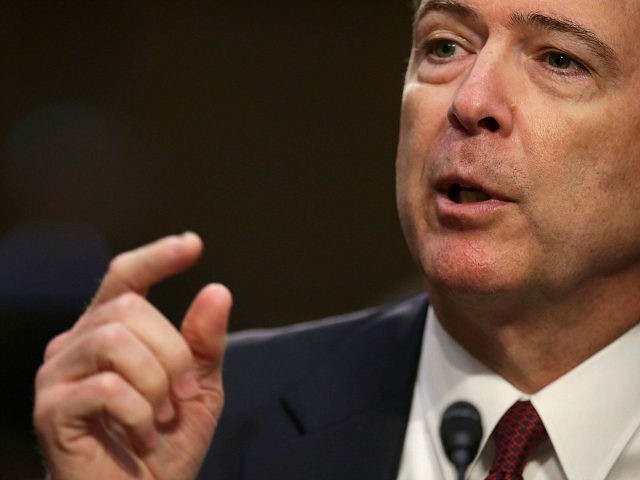A four-page House Intelligence Committee memo alleging abuse of surveillance authority raises immediate questions about former FBI Director James Comey’s role in utilizing the infamous, largely discredited 35-page anti-Trump dossier to obtain a FISA court warrant to monitor an individual associated with Donald Trump’s 2016 presidential campaign.
One glaring possible inconsistency centers on Comey’s June 8, 2017 prepared remarks for the Senate Select Committee on Intelligence, where he referred to the anti-Trump dossier as containing “salacious and unverified” material.
Yet, according to the memo crafted by House Republicans, Comey personally signed three FISA court applications utilizing that same dossier that he labeled “salacious and unverified” eight months later to obtain FISA court warrants to conduct surveillance on Carter Page, who briefly served as a volunteer foreign policy adviser to Trump’s 2016 campaign.
The memo documents that on October 21, 2016, the FBI and Justice Department sought and received the FISA order against Page, and that the agencies sought the renewal of the order every 90 days in accordance with court requirements. Renewals require separate finding of probable cause each time, the memo relates.
According to the memo, Comey “signed three FISA applications in question on behalf of the FBI, and Deputy Director Andrew McCabe signed one.” Sally Yates, then-Acting Deputy Attorney Gernal Dana Boente, and Deputy Attorney General Rod Rosenstein signed one or more of the applications on behalf of the Justice Department.
The memo relates the FBI utilized the anti-Trump dossier compiled by former British spy Christopher Steele as evidence against Page in order to obtain the FISA warrant.
However, according to the memo, the FBI and DOJ failed to inform the FISA court of the following:
- That Steele’s Dossier was reportedly funded by Hillary Clinton’s 2016 presidential campaign and the Democratic National Committee (DNC) via the Perkins Coie law firm. “Neither the initial application in October 2016, nor any of the renewals, disclose or reference the role of the DNC, Clinton campaign, or any party/campaign in funding Steele’s efforts, even though the political origins of the Steele dossier were then known to senior and FBI officials,” the memo states.
- That the initial application notes Steele worked for a “named U.S. person” but does not name the controversial firm Fusion GPS or its founder Glenn Simpson.
- That Steele reportedly met with Yahoo News at the direction of Fusion GPS. A Yahoo News article about an alleged trip by Page to Moscow was cited in the FISA warrant, according to the memo.
After he allegedly signed three FISA applications based on Steele’s dossier, Comey publically referred to Steele’s work as “salacious and unverified.”
In Comey’s June 8, 2017 prepared remarks for the Senate Select Committee on Intelligence, the former FBI chief says that following a January 6 Oval Office meeting with Intelligence Community leaders, Comey “remained alone with the President Elect to brief him on some personally sensitive aspects of the information assembled during the assessment.”’
It is clear Comey was referring to the dossier since he writes the “salacious and unverified” material was about to be publically reported by the news media.
He writes:
The IC leadership thought it important, for a variety of reasons, to alert the incoming President to the existence of this material, even though it was salacious and unverified. Among those reasons were: (1) we knew the media was about to publicly report the material and we believed the IC should not keep knowledge of the material and its imminent release from the President-Elect; and (2) to the extent there was some effort to compromise an incoming President, we could blunt any such effort with a defensive briefing.
Four days after that briefing, the dossier was published by BuzzFeed.
Also, in his statement summarizing his conversation with Trump, Comey refers to Russian prostitutes, a key component of the dossier:
He said he had nothing to do with Russia, had not been involved with hookers in Russia, and had always assumed he was being recorded when in Russia.
In a private White House dinner with Trump on January 27, Comey says the topic of the “salacious material” again came up and he reveals that Trump was considering asking the FBI to investigate the origins of the claims. Comey pushed back against that idea.
Comey writes:
During the dinner, the President returned to the salacious material I had briefed him about on January 6, and, as he had done previously, expressed his disgust for the allegations and strongly denied them. He said he was considering ordering me to investigate the alleged incident to prove it didn’t happen. I replied that he should give that careful thought because it might create a narrative that we were investigating him personally, which we weren’t, and because it was very difficult to prove a negative. He said he would think about it and asked me to think about it.
Meanwhile, despite his role in signing three FISA applications based on a largely debunked dossier that he himself referred to as “unverified,” Comey on Friday took to Twitter to claim the memo’s release “destroyed trust” with the Intelligence community.
That’s it? Dishonest and misleading memo wrecked the House intel committee, destroyed trust with Intelligence Community, damaged relationship with FISA court, and inexcusably exposed classified investigation of an American citizen. For what? DOJ & FBI must keep doing their jobs.
— James Comey (@Comey) February 2, 2018
Aaron Klein is Breitbart’s Jerusalem bureau chief and senior investigative reporter. He is a New York Times bestselling author and hosts the popular weekend talk radio program, “Aaron Klein Investigative Radio.” Follow him on Twitter @AaronKleinShow. Follow him on Facebook.
Written with research by Joshua Klein.

COMMENTS
Please let us know if you're having issues with commenting.